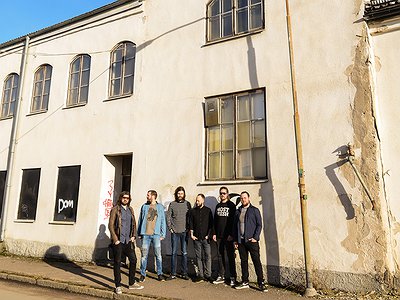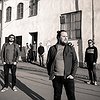Could you take us through a day in your life, from a possible morning routine through to your work? Do you have a fixed schedule? How do music and other aspects of your life feed back into each other - do you separate them or instead try to make them blend seamlessly?
A typical day would be waking up with my kids (I have two, a daughter who’s five years old and a boy who’s two years old) at around 6:30 and then we have breakfast and I drop them off at pre-school. I then go back home and enter the studio to begin the day's work. Usually this would include writing, recording or producing a song. Sometimes I have to learn songs for a show I’m doing or sometimes I go to rehearsals with a band. Other times I would head off to play a show out of town and won’t be back until the next day or a week later or something. It’s a tough life as far as the family is concerned and sometimes it’s hard to make it work, but thankfully so far it has.
Could you describe your creative process on the basis of a piece or album that's particularly dear to you, please? Where did the ideas come from, how were they transformed in your mind, what did you start with and how do you refine these beginnings into the finished work of art?
There’s a song on the new Gungfly album, it’s actually the closing song of the album (there’s a spoken word type thing following it though) and it’s called “The River of Sadness”. This song started out as a short piano piece and though I really enjoyed it, I though “Ok, so here I go again, this is typical me – a short weird Zappaesque tune that no one will really care about”. So instead I decided to build an entirely different song around it, because this one didn’t even have any vocals on it. I started working around the part and it turned into this two-chord string-based thing where I found a vocal melody and a back-beat drum part that I really liked. After that I decided to go power-pop and the chorus is sort of a mix between ELO and Salem Al Fakir (Swedish pop artist) with big dramatic synth chords and a bunch of distorted guitars topped off with some belting vocals going “Tell it all again, like it was the very first time…”. It’s a song about losing someone you love, almost like you’re seeing them for the last time and you know it is in fact the last time.
I sometimes have a hard time looking back once I’m ankle-deep into a song or a project – I just look forward and I think that makes the songs take on many shapes before they’re finished.
There are many descriptions of the ideal state of mind for being creative. What is it like for you? What supports this ideal state of mind and what are distractions? Are there strategies to enter into this state more easily?
If the project I’m currently working on is interesting enough, that’s all the inspiration I need actually. I can be distracted but will find my way back pretty quickly as long as I’m into what I’m doing. If it’s a project that I’m just assigned to and I’m a hired gun and I don’t really like the song or something I will put it aside until the very last minute.
How is playing live and writing music in the studio connected? What do you achieve and draw from each experience personally? How do you see the relationship between improvisation and composition in this regard?
It depends on the band you’re playing with. Right now I’m mainly writing music for myself and in that setting I’m just hammering stuff out regardless of how the live version is gonna be, because I tend to separate the two. Some bands love to do the songs exactly like they are on the album with every detail present – I’m not like that with my material, I actually like it to be different. I appreciate both worlds actually but for Beardfish we usually separated live from studio and Gungfly is the same. The core of the song will be there but I like there to be room for some improv for the players and myself.
How do you see the relationship between the 'sound' aspects of music and the 'composition' aspects? How do you work with sound and timbre to meet certain production ideas and in which way can certain sounds already take on compositional qualities?
A lot of music is soundbased, no question, and I think a lot of progrock is too. People often credited Beardfish for being very vintage sounding but I think it boiled down to us actually being an old school band that knew how to play together as a band. I like that way of working very much and Gungfly is the same way. I usually tend to lean more towards playing qualities than sound while composing and recording though and instead rely on instruments, amplifiers and effects that I really like, usually old organs and pianos, guitars, leslies and tube amps.
Our sense of hearing shares intriguing connections to other senses. From your experience, what are some of the most inspiring overlaps between different senses - and what do they tell us about the way our senses work? What happens to sound at its outermost borders?
I’ve closed my eyes during a concert and seen colours shifting between brown, red and yellow (and it wasn’t the stage lights) during certain dramatic parts of certain songs and then opened my eyes again to find myself revitalised.
Art can be a purpose in its own right, but it can also directly feed back into everyday life, take on a social and political role and lead to more engagement. Can you describe your approach to art and being an artist?
For me it’s not something I have to approach in any way, it’s just an everyday thing just because it’s been a natural way of life for me for as long as I can remember. If I’m away from it for too long, say if I’ve finished an album or a tour and I relax for a few weeks I can have some trouble finding my way back into the creative realm, but it usually sorts itself out because a melody will come to me when I least expect it.
It is remarkable, in a way, that we have arrived in the 21st century with the basic concept of music still intact. Do you have a vision of music, an idea of what music could be beyond its current form?
Sadly, no… I just find music to be perfect as it is. There’s still a ton of stuff to explore… New artists pop up every day and they all have new ideas what to do with the twelve notes we have to work with in the western world. I’m still exploring so my answer might be different in a few years.



